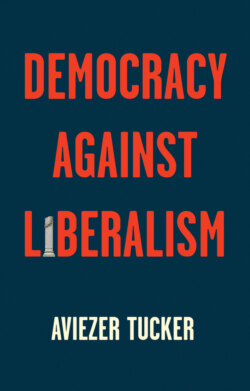Democracy Against Liberalism

Реклама. ООО «ЛитРес», ИНН: 7719571260.
Оглавление
Aviezer Tucker. Democracy Against Liberalism
Contents
Guide
Pages
Democracy Against Liberalism. Its Rise and Fall
Copyright page
1 What’s Your Problem? Illiberalism, Populism, Authoritarianism
Democracy vs. Authoritarianism
Liberalism vs. Absolutism
Populism vs. Technocracy
Eight Regimes
The Scope of Neo-Illiberal Democracy
Weimar, Jackson, Singapore
Plan of the Book
2 Illiberal Democracy: Old Hemlock in Plastic Cups
The Self-Destruction of Absolute Democracy
Neo-Illiberal Unbalancing of the Liberal Checks
The Judiciary
Civil Service
Civil Society and Independent Institutions
Unmediated Politics
Media
Disinformation
Populism as Wishful Thinking
Historical Amnesia and Sisyphean Politics
Neo-Illiberalism is not Neo-Nationalist
Neo-Illiberalism is not an Over-Reaction to Immigration
Neo-Illiberalism is not Confused Socialism
3 All the Roads Lead to Caesarea
Post-Post-Totalitarian Pathway
Path Dependency II
A House Divided: Prognostic Instability
Budapest on the Potomac
The Surf Beaches of Utopia
Dynamic Equilibria
4 It Ain’t Necessarily So: The Historical Evitability of Neo-Illiberal Democracy
Historical Evitability
A Contemporary Case for Economic Inevitability
What happened?
Contingencies
Hungary
Brexit
Trump
5 New Liberalism without Nostalgia
Preempting Populism
Universal Basic Income
Dispersing the Anonymous Mob: Tracing Electronic Origins
Historical Education and Commemoration
Breaking the Glass Barriers to Mobility
Geographic Mobility
Strengthening Liberal Institutions
Democratic Election Systems
New Liberalism without Nostalgia
References
Index
POLITY END USER LICENSE AGREEMENT
Отрывок из книги
Aviezer Tucker
Populist neo-illiberalism has generated engaged interest and earnest confusion in equal measures. The verb “to happen,” especially in the indefinite passive voice has become the key political verb. Politicians, commentators, and social scientists reacted as if a meteor had stricken the political planet. Nobody quite understood what hit them. Nobody was responsible, but everybody has become anxious. A telling example is Hillary Clinton’s electoral self-postmortem autopsy, entitled What Happened? Madeleine Albright in a book entitled Fascism: A Warning (2018) replied: “Trump happened.” Things happen, unfortunate events “befall,” when there is no agency and no responsibility. Denial of responsibility assumes historical inevitability; it happened because it had to happen and nothing anybody could have done would have changed that. Alternatively, at the cost of accepting responsibility, it is possible to regain agency and accept that things could have been different, history could have taken a different course, had some people made better choices.
.....
Plato identified in his Republic two related problems with technocracies. When self-proclaimed experts disagree, as they often do, there is no higher authority to decide who the real experts are, who has knowledge and who has mere opinion. Experts also have group and personal interests that may bias their judgments. A technocratic class may mistake its own self-interest or even, perish the thought, its passions, for expert analysis. Indeed, Plato’s own political philosophy may be interpreted in such terms. Technocrats are just as corruptible as everybody else both as individuals with interests, and as a class that has shared common interests in protecting its privileges.
Since experts as a class cannot be trusted to act more impartially than anybody else, liberal constitutions place them in institutions that should supervise and compete with each other. The increase in the power and complexity of the state has required a commensurable growth in technocratic liberal institutions that balance each other like the Central Bank, the BBC, and the Ombudsman, and so on, to check the power of the technocratic state. That mutual growth is not contradictory but necessary, the bigger the state is, the more necessary it is to curb its powers. It is impossible for modern states to function with no technocratic expertise and assistance. Even if policy ends are dictated by the passions, populist politicians need a technocratic bureaucracy to devise means to try to realize them. The horrors of twentieth-century totalitarianism and authoritarianism resulted from the efficient use of technocrats to implement passionate politics.
.....